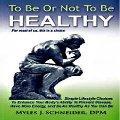To Be or Not to Be Healthy was inspired by Myles Schneider's personal experience. "Almost 11 years ago, I was 55 years old, and I stress the word 'old,'" he says. "I had back problems and neck problems. It started happening in the 30s, worsened in the 40s and by the time I was 55, something seemed to be hurting me all the time. Then a friend of mine introduced me to some ideas and concepts. I started getting better and now, knock on wood, I'm doing a lot better than I did then. Now, I can say I'm 66 years young," Schneider says. A lifestyle, not a treatment When Schneider, a podiatrist, examined his life style, he says it became clear to him that what he needed was not medical treatment. "I think a lot of people don't realize there is a lot you can do to help yourself," he says. "You don't have to feel 'old' as you age, or as old as you think you do. You don't have to age as fast as you're told you have to age. The truth is, it has nothing to do with doctors, lotions, potions, medicines or surgical procedures, tests. It has to do with simple choices that you make, literally, every day of your life," Schneider explains. Make a habit of eating three meals a day He says many people have turned responsibility for their health over to the health care system. They expect their doctors to come up with miracles to make them feel better, no matter what they do to themselves. Instead, Schneider says, people must take control of their own lives, and, in To Be or Not to Be Healthy, he outlines six healthy habits to live by. Number one is eating right.
"That starts with three good meals a day that are balanced, with a proper balance of carbohydrates, protein and fats, and two snacks a day," he says." [The U.S government website] mypyramid.gov is an incredible website with incredible amount of information," he says. Learn to let go of stress The next three healthy habits should also be familiar: Drink enough clean water, get enough sleep and exercise regularly. Managing stress is another important habit to get into, Schneider says.
"If you have stress, the simple short-term thing you can do, the everyday thing, is meditate," he explains. "Get out of the world that causes your stress, short-term. Long term, if it is chronic, which are the ones we're worried about, we have to change perception of it, or your reaction to it, try to make something positive out of it. [For example,] if you have a long commute to work every day and you get upset about traffic, start to read books on tape, or start listening to music. If you think you don't spend a lot of time with the family because you're on the road so much during traffic, then at least value the time when you see them more. Try to change your perception of what's happening so it's not so stressful," Schneider urges. Rid your home environment of pollution Because our bodies need oxygen, Schneider includes breathing clean air on his list of healthy habits. That requires reducing air pollution, especially indoors.
"You want to make sure there is no mold in your house," he says. "Try to use organic, natural sprays and cleaning materials if you can and can afford it. In the home I use small room air systems as opposed to the whole house because [with] the whole house [systems], the air is going to sit in the ducts and the ducts are going to get dirty, unless you clean them once a year, and even once a year, the ducts can still get dirty. You have to be careful with home air systems. Some of them produce ozone, which is not good for you. Good air systems are going to have multiple filters. One filter doesn't filter everything out," he advises. Healthy habits ward off illnesses Schneider says since we are creatures of habit, it's easy to make good health habits part of everyday life. That, he says, can help us fight off diseases, from the common cold to H1N1.
"If you eat well, sleep well, exercise regularly and drink a lot of water, take supplements, try to manage stress and breathe as fresh, clean air as you can, your immune system will be as strong as it can be," he explains. "Your body will be more apt to ward off that type of virus if it attacks you." The author of To Be or Not To Be Healthy hopes more people will choose to be healthy and get in the habit of taking responsibility for their own well being.

